-
Improving Your Recycling Habits
With global climate change becoming an ever-clearer reality, it’s important for everyone to do their part. One of the easiest ways to reduce your carbon footprint is to learn more about recycling. If you have any questions about recycling, be sure to watch this video and reach out to a waste management company in Atlanta .
This video includes a number of humorous reducing, reusing, and recycling suggestions provided by several YouTube personalities. Instead of throwing your paper into the trash, you can cut it up into small pieces and use it as compost. You might also deposit your empty cans and bottles for money, then use that money to treat yourself to something nice at the end of the month. Each time you go to the grocery store, be sure to take a reusable bag. It’s also a good idea to take a travel mug with you when you go to your favorite coffee shop.
-
Dealing with Waste in a School Setting
School is essential for shaping the minds of the next generation. Like any other productive and important institution, however, schools tend to produce waste. Whether you’re trying to come up with waste management solutions for an elementary school or a university, consider working with a waste management company in Atlanta to address the following considerations.
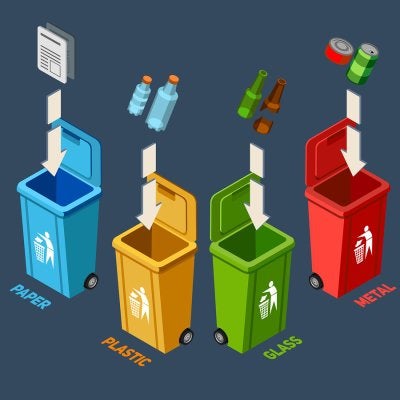
Determining Waste Generation
Before you can implement an effective waste management plan, you must first determine how much waste your school generates on average. It might be helpful to keep track of the waste from each department; that way, all the departments in your school can work together to reduce unnecessary waste.
Raising Recycling Awareness
Learning to recycle is important for preschoolers and grad students alike. You and your waste management company will find that recycling is a lot easier if the students put their waste in the right bins. As you begin a new partnership with recycling experts, consider teaching your students the basics of recycling. You might even have a designated recycler stand near the bins at lunchtime to make sure waste makes it into the appropriate places.
Setting Up a Recycling Program
Institutions that generate a considerable amount of waste can benefit from working closely with waste management companies. For example, you could ask your local recycling experts what to do with old desks or obsolete computers. Partnering with a local waste management company in Atlanta is a great way to ensure that your waste needs are met in a responsible manner.
Disposing of Delicate Paperwork
Students often need to provide schools with personal information during the admissions process. When the time comes to dispose of that information—usually years after the student has graduated—it’s the school’s responsibility to make sure it is done so in a discreet and responsible manner. Failure to do this could result in embarrassment or even identity theft.
-
What to Do with Old Computers
When people think about recycling in Atlanta , they often forget to consider electronics recycling. Many different types of commercial, industrial, and retail businesses generate electronics waste when they replace their broken appliances and equipment with new models. Your local waste management company or recycling center can offer you valuable information and recycling facts about how to dispose of old computers and other electronic devices.
When you throw an old computer into a dumpster, it is simply hauled away to a landfill during trash pickup. A computer will not decompose naturally, but it does contain many toxins that are bad for the environment and may seep into the soil in a landfill. Instead, you can arrange for bulky pickup or junk removal of your electronic devices through your waste management company. Some recycling centers reuse or refurbish computer parts, while others may donate working electronics to schools or charitable organizations.
If there is nothing to salvage or reuse in your computer, your recycling center will ensure that it is disposed of according to the federal and local laws. Reputable recycling centers will recycle electronic devices without resorting to using landfills, incinerators, prison labor, or selling it to a developing country.
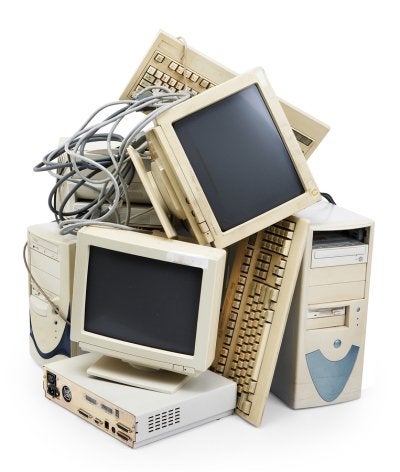
-
Ways to Reduce, Reuse, and Recycle for the Environment
As a business owner, it’s important to think of the best ways that your company can reduce, reuse, and recycle in Atlanta . Your local waste management company can provide you with valuable information about local recycling centers and key recycling facts that will help you implement a comprehensive recycling program in your building. Here are just some of the ways that you can reduce, reuse, and recycle throughout your company.
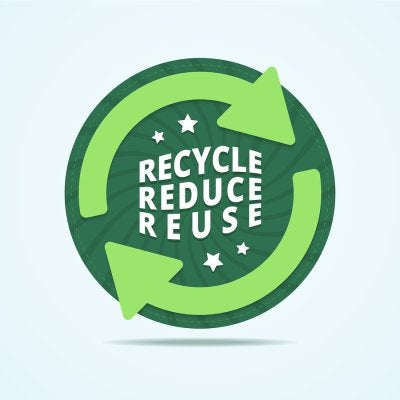
Reduce Your Use of Paper and Office Supplies
Most businesses generate a lot of waste, but you can reduce the waste you generate in a number of ways. Instead of printing out documents, develop an internal messaging system through which you can convey information to employees. Set up an e-billing system for vendors and clients so that you no longer receive paper copies of bills. Encourage employees to only use non-recyclable office supplies when it is absolutely necessary.
Order Green Products and Energy-Efficient Appliances
The person who is in charge of ordering company supplies can also contribute to your efforts to reduce, reuse, and recycle. You can order green products that can be recycled, or that are biodegradable and won’t contribute to hazardous waste or pollution. You can also purchase recycled and recyclable paper and packaging materials. When it’s time to replace office appliances, you can opt for appliances that are energy-efficient and that won’t contribute to pollution and hazardous waste.
Recycle and Reuse Whenever Possible
When you contact your local waste management company about garbage disposal and junk removal, you should also ask for some important recycling facts. Your waste management company can provide you with recycling bins to place around the building to encourage visitors and employees to recycle. If you’re in need of junk removal, you can find out if any items are eligible for scrap metal recycling, cardboard recycling, plastic recycling, or electronics recycling. You may also be able to share and reuse certain items, like file folders and envelopes, throughout the company.
-
How Metal is Recycled
If your company’s recycling program includes scrap metal recycling in Atlanta , you may be interested in learning more about how metal is recycled. Typically, recycling centers can manage metal recycling for copper, steel, aluminum, brass, iron, and metal wires. All recycling centers are different, however, so you should confirm what metal recycling capabilities yours has. Each type of metal is recycled in a different way.
Watch this video to learn more about how metal is recycled. Metal recycling can reduce the cost of your company’s waste disposal, improve your business’ environmental practices, and generate valuable, recycled materials rather than causing an increased demand for new products. Recycled metal can be used in the production of cans, cars, boats, metal casts, or ingots.
-
Methods of Industrial Waste Management
If you own a company that generates hazardous or industrial waste, it’s crucial that you think about the safest methods of waste management in Atlanta . The most effective methods of industrial waste management are ones that aim to reduce, reuse, and recycle when possible, and that are guaranteed to cause no harm to the environment. Here is a look at the best methods of industrial waste management in your area.
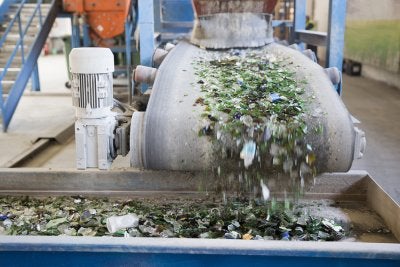
Segregation and Recycling
Much of the waste that is generated by your company’s production, shipping, and packaging needs is not reusable or compostable, but it is recyclable. The first step in your industrial waste management program is to identify which items can be recycled, and set up recycling bins or dumpsters into which they can be sorted. Most recycling centers can handle glass, paper, and plastic recycling. Many can also handle scrap metal recycling, cardboard recycling, food waste recycling, and electronics recycling. You must segregate and separate your recycling from your hazardous waste, compostable waste, and non-hazardous solid waste.
Use of Landfills
Landfills are one of the most common ways to dispose of waste in America. The only waste that should be sent to landfills is that which is non-hazardous, non-recyclable, and non-compostable. When waste is sent to a landfill, it is confined to a small area, compacted when necessary, and then buried in the earth. As the waste decomposes, it releases gases that can be converted to natural gases used for power and fuel. Landfills are cost-efficient and are designed to minimize the harm done to the environment.
Composting
The composting process turns organic waste into fertilizer that can be used to nourish plants. Most food waste can be composted, and even unsafe organic items can be turned into safe composting. You can compost food waste, leaves, newspaper, very small pieces of cardboard, straw, and sawdust. Compost is then added to soil to provide nutrients and encourage growth. Composting is one of the most effective ways to reuse and recycle waste.
-
Reasons to Track Your Waste
If you’re concerned about the cost of your company’s waste disposal in Atlanta , you should ask your waste management company about tracking your company’s waste. A waste analytics program allows you to determine exactly where and how you are generating the most waste, and thus paying the most for trash pickup, junk removal, and waste disposal. Tracking your company’s waste will also allow you to identify sustainable ways to reduce your waste production, reuse items when possible, and recycle items when possible.
When you know which waste items are recyclable, you can set up a recycling program through your local recycling center. Make sure that you place recycling bins throughout your building, and inform all employees of key recycling facts. The more items that you are recycling, the less will have to be hauled away for waste disposal in a landfill.
Tracking your company’s waste will also enable you to set up a more efficient trash pickup and garbage disposal schedule. You can save money on waste management and waste disposal costs by reducing the number of times you need trash pickup and junk removal each month.
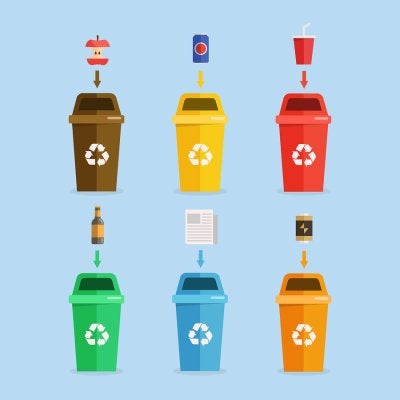
-
Understanding Paper Recycling
If you have recently implemented a recycling program for your company, you may be interested in learning more about paper recycling in Atlanta . Any paper waste that your company generates can be collected in recycling bins, picked up by your waste management company during your regular trash pickup, and sent to your local recycling center. This paper is then sorted, cleaned, and graded at the recycling center, and is then sent to a paper mill.
Watch this video to learn more about the paper recycling process. After recyclable paper is sent to a paper mill, it is turned into pulp, and any non-recyclable elements, such as staples, are removed. It may then be bleached. Recycled paper may be turned back into cardboard, paper, glass, cans, food and drink cartons, plastic bottles, or clear sacks.
-
Improving Waste Management Strategies at Your Restaurant
If you’re interested in making your restaurant greener, you should look into improving your waste management, recycling, and waste disposal in Atlanta . A comprehensive and effective waste management program is key to ensuring that you save money and protect the environment. Here are some ways that you can improve the waste management strategies at your restaurant.
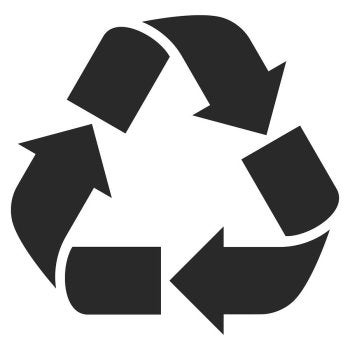
Sustainability and Zero Waste Initiatives
The best and most sustainable waste management program is one that minimizes your environmental impact while reducing your waste management and waste disposal costs. Your waste management company should focus on reducing, reusing, and recycling whenever possible. You can not only reduce the cost of your waste disposal, but also reduce the amount of waste that is generated in the first place. One of the ways that you can do this is by implementing a zero waste initiative. A zero waste initiative is a commitment to reduce the amount of waste that is sent to a landfill for waste disposal. This is achieved by investing in single-stream recycling and organics recycling.
Single-Stream Recycling
Recycling centers that offer single-stream recycling do not require companies to sort their recyclables into separate recycling bins or dumpsters before pickup. Instead, all recyclables can be put into the same recycling bin or dumpster, and they are then picked up by your waste management company and sorted at the recycling center. This makes it easier for employees and guests to participate in your restaurant’s recycling program, and it also saves the company money and labor trash removal, junk removal, and waste disposal.
Organics Recycling
One of the most voluminous types of waste that restaurants produce is organic waste, or food waste. Rather than throwing food and food byproducts away to be sent to a landfill, you can participate in your recycling center’s organics recycling program. Organic waste will be composted and then used as fertilizer and soil nutrients. Food waste that can be composted includes fruits, vegetables, meat, poultry, seafood, animal bones, shells, bakery items, eggs, paper egg cartons, milk, juice, paper juice cartons, plants, cut flowers, coffee grounds, coffee filters, tea bags, paper products, ice cream, yogurt, and cottage cheese.
-
How to Reduce Waste at Your Office
Offices typically generate quite a bit of waste in Atlanta , from paper, plastics, and glass, to food waste and electronics waste. Your local waste management company can help you develop and implement a sustainable waste management program that allows you to reduce, reuse, and recycle throughout the office. Here are some great ways that you can reduce waste at your office.
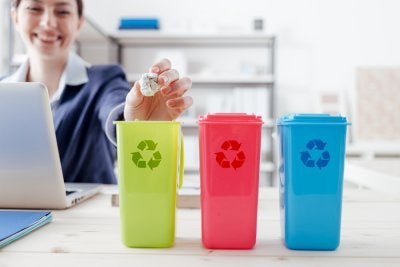
Reduce Waste Generation
You can quickly reduce the amount of waste that is generated throughout your office by reducing your reliance on paper products. Encourage employees to share information electronically, and resist printing out materials for your use or to convey information. You can also stop using cover sheets on faxes, print documents on both sides of the paper, use the copy machine less often, eliminate unnecessary forms or redesign them to use less paper, and post announcements electronically or on a central bulletin board. You can also use fewer paper products in your kitchens and bathrooms, and instead use washable, reusable products.
Reuse Valuable Materials
You can reuse valuable materials, like paper, throughout the office. Paper only has printing or writing on one side can be reused as scratch paper. File folders, internal envelopes, binders, packaging materials, and other office supplies can be shared and reused throughout the office. You can also donate items that can’t be used again within the office to other charities or organizations so that they won’t end up as waste.
Recycle and Compost When Possible
Your local recycling center can provide you with valuable recycling facts and can inform you as to which items are recyclable and compostable. Most recycling centers can process paper recycling, glass recycling, cardboard recycling, and plastic recycling. Some can also manage scrap metal recycling and electronics recycling. Do not dump or throw away any office item that can be safely recycled. Place recycling bins throughout the office, and arrange for your waste management company to pick up your recycling when they do your trash pickup. Most food waste can also be composted and used for fertilizer. Find out if your office generates food waste that is compostable, and ask your recycling center or waste management company about composting.
RECENT POSTS
categories
- Uncategorized
- Waste Management Atlanta
- Waste Disposal and Recycling
- Hazardous Waste Disposal
- Chemical waste removal
- solid waste removal
- R3 Program
- Sustainable Organizations
- Sustainable Waste Removal
- Commercial Waste Removal
- Materials Management Program
- Dumpster Rental
- Roll Off Dumpsters
- Construction Site Waste Removal
- Sustainability
- Recycling in Atlanta
- Industrial Recycling
- Industrial Waste Removal Services
- Southern Waste & Recycling
- Waste Removal Atlanta
- Waste Specialists
- Atlanta
- Infographic
- Front Load Dumpsters
- Rear Load Dumpsters
- Reusable Electronics
- Dump Truck Atlanta
- Recyclable Electronics
- Trash Compactors
- Recycling
- Recycling Program
- Office Recycling
- Metal Recycle
- Electronic Waste
